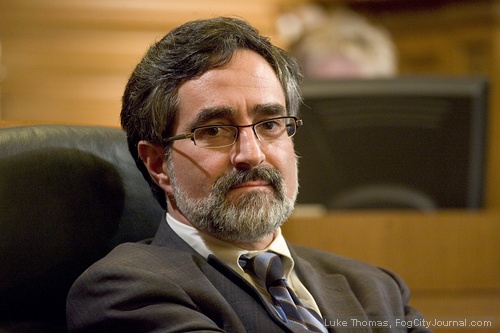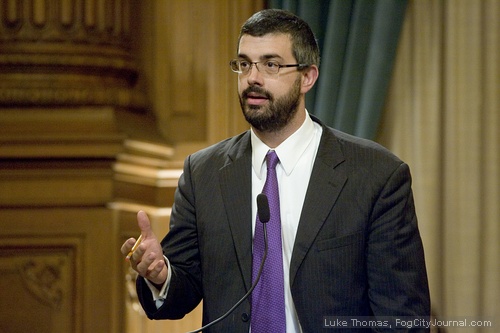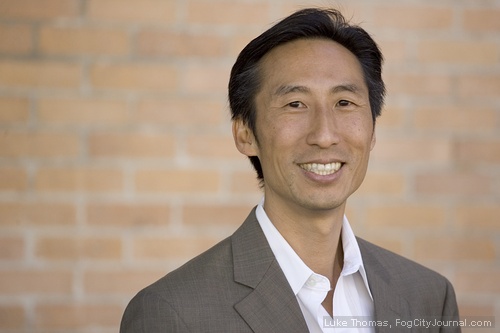
Savannah Blackwell
Despite a multi-million dollar campaign against their candidates and interests,
progressives hold on to their power in San Francisco
November 10, 2008
Roughly 24-hours after the polls closed in San Francisco, outgoing Board of Supervisors President Aaron Peskin was headed down to North Beach for an Italian-style victory meal when he decided to take the opportunity to make the forces behind the nearly $670,000 soft money campaign to eliminate the board’s progressive majority, eat a little crow.
The building that houses Tommaso Ristorante Italiano on Kearny Street also contains the office of political consultant Alex Tourk, the former aide to Mayor Gavin Newsom who had worked for a pro-development/anti-progressive committee whose leader had vowed to take the city “on a sharp turn to the right.”
Peskin removed from his car two of the group’s door hangers urging support for its candidate, Joe Alioto, Jr., took out a Sharpie, signed his autograph and hung one hanger on Tourk’s doorknob and slid the other under Tourk’s door.
The Board President had good reason to engage in a little chest thumping. The candidate he wanted to replace him in District 3, David Chiu, was winning handily, and progressives Eric Mar and John Avalos had finished first in District’s one and 11 respectively. Those were the three districts where the incumbent progressives were termed out and where corporate and developer-funded political action committees had spent huge sums of cash pushing candidates who would represent their interests and give Newsom control of the board.
 
San Francisco Board of Supervisors President Aaron Peskin
Meanwhile, many of the initiatives favored by these same groups, including one that would have eliminated the supervisors’ power of appointment to the Transportation Authority and given it to Newsom, and another that would have increased funding for Newsom’s pet Community Justice Center project, had lost, while many propositions Peskin and progressives supported — such as increasing revenues from real estate and business interests and empowering tenants to fight back against bad landlords — had won.
The next day, Tourk texted Peskin: “Appreciated the autographed door hangers. Pendulum can’t swing one way forever, brother.”
The pendulum, however, wasn’t moving this time.
Thanks to a colossal, $292,000 effort by the local Democratic Party (headed up by Chair Peskin), a $370,000 push from Labor for the progressives’ and the party’s slate for supervisor, as well as the party’s decision to tap into the grassroots movement behind Barack Obama, local progressives lost no ground on election night.
Most significantly, the results show that voters continue to identify progressive-backed candidates as the ones with genuine ties to their neighborhood districts.
“As weak as their candidates were, ours were really strong,” said Supervisor Chris Daly.
The author of much of the campaign mail for Avalos, his former aide, Daly was heavily involved behind the scene in the progressives’ efforts.

Supervisor Chris Daly
It Might Not Have Happened
Heading into 2008, progressives had a problem. Unlike in early 2000, when there was a great deal of grassroots momentum generated by the phenomenal 1999 write-in campaign for Supervisor Tom Ammiano for mayor, as well as the organizing efforts against the displacement and gentrification caused by the dot-com boom, in early 2008 progressives were faced with a limp base.
The situation had resulted from disappointment over the failure to field a candidate against Newsom’s 2007 re-election bid, and the fact that progressives had gone more than year without a local campaign cause that would have drawn out and strengthened the troops. But in spring, during the final days before the deadline to file for candidacy for a seat on the San Francisco Democratic County Central Committee, Peskin, Daly and Supervisor Jake McGoldrick decided to jump in with the idea of using their committee membership to connect with progressives who, Daly figured, would be energized around Obama’s campaign.
“Initially, we had no wave to ride,” Daly said. “But I knew that if we could hitch our trailer to the Obama movement, we could basically turn progressives out for our candidates as well as for him.”
The local party’s slate mailers prominently featuring Obama’s image with its candidates for supervisor on the flip slide created a connection in the minds of voters, Daly said.
Meanwhile, the pro-business/pro-Newsom forces had an advantage. Given that Newsom faced no significant challenge in 2007 and had needed no major funding, those interests had plenty of money to spend and saw a chance to change the complexion of local politics to mirror their own.
They either forgot or did not realize, however, that money alone does not make for energized campaigns.
Peskin said he made a habit each evening after leaving City Hall to drive up Polk Street, look into the windows of D3 candidate Denise McCarthy’s campaign headquarters where he would see three to five volunteers, then past those of Alioto, Jr. – “which [were] usually locked and dark” — and then pick up a pizza to take into Chiu’s campaign office, where on any given night there were 20 people working the phones and making other efforts to get their candidate elected, he said.
“They tried every dirty trick in the book, spent millions and millions of dollars, but we had real people with real neighborhood connections,” Peskin said.
PG&E’s $10 million campaign that defeated Proposition H, the clean energy/public power initiative, failed to sweep in downtown’s Districts One, Three and 11 supervisor-candidates who had opposed the measure.
The corporate-funded initiative calling for the re-establishment of the JROTC program in San Francisco schools, which anti-progressives had hoped would create a successful wedge issue, won only narrowly while also failing to make the difference in the same three targeted districts.
“Downtown continues to put up candidates who have no personality, or who have negative personality,” noted one consultant who worked for that effort and asked not to be identified. “After a while, it becomes clear that you have to have an alternative vision, and none of these candidates did.”
In the final days before the election, the consultants working for the pro-business/pro-Newsom/pro-development candidates had even written off the not very personable Safai in D11, but were still hopeful for Alioto, Jr. in D3, the source said. Their strategy was to keep up appearances that Avalos was in trouble (a parade of vehicles bearing Safai campaign signs with blasting horns toured Mission Street in D11 on Sunday before the election), in order to force Labor to expend its people and resources there in the final days and, they had hoped, back off on District One, where they were most confident — as polls showed Mar trailing at least several points behind downtown candidate Sue Lee.
“They really thought they had that one,” the source said. “But all the money in the world is ineffective if you spend it stupidly.”
Downtown’s Strategy Failed/Progressives’ Succeeded
Late on Friday afternoon after the election, Peskin left a message for Jim Fabris, the head of the San Francisco Realtors’ Association. The realtors had funded a television ad that ran constantly and urged voters not to cast their ballots for Mar, Chiu and Avalos – identifying the three as the “hand-picked cronies” of Daly.
“Let’s not give the keys to the City to Chris Daly and his puppets,” the ad sneered.
Peskin and other observers figured the piece backfired through overkill and ironically helped the three candidates by increasing their name recognition with voters.
“I just wanted to call and thank him for everything he did on behalf of the candidates I’ve supported,” Peskin told Fabris’ office assistant. “We couldn’t have done it without him.”
Downtown’s consultants have to recognize that “the era of the anonymous call and the anonymous ad is over,” said Greg Dewar, a consultant who did some on-line advertising and advocacy work for PG&E and Supervisor Carmen Chu, who appeared in television ads opposing Prop. H. “The biggest influence on voters’ decision is people or organizations they know.”
Dewar pointed out that the realtors might have fared better if they had tapped their members with offices in the districts to get out and talk personally with residents in the neighborhood about the candidates they supported.
Obama’s campaign shows that the new political environment is about organizing on the neighborhood level. But the anti-progressives did not even attempt to do that, and their underhanded efforts to appear to have done so, failed.
So Much For Dirty Tricks
In late October, a move was made to diffuse the power of the local party’s endorsement of progressive candidates for supervisor by creating a new club with a similar sounding name, “The San Francisco Democratic Party Club,” and sending out mailers or phone calls saying Lee, Alioto, Jr. and Safai were its endorsed candidates. (The San Francisco Bay Guardian reported that PG&E, the Chamber of Commerce, the Golden Gate Restaurant Association and the Committee on Jobs funded the club).
A consultant privy to the effort had advised that it would fail, because no real work was done to establish the club early enough in the season so that it could have actual neighborhood resident involvement. As such, there was no identifiable human face to put on the mailers or associate with the calls.
Meanwhile, the real local Democratic Party responded by increasing its slate mail campaign and also sending out mailers or providing phone banking specifically on behalf of Mar, Chiu and Avalos to remind voters of the club’s actual endorsement.
Not since the days of former mayor Willie Brown has the club been so active and well funded in its election efforts.
Progressives successfully fought back other sleazy and misleading moves by sending out mail seeking to present candidates’ positions accurately. For example, in her bid for D1 supervisor, Lee had produced a mailer claiming she would represent renters: “From the Richmond. For tenants.”
In reality, Lee was benefiting from a $282,000 soft money campaign that was funded by downtown and development money, and aimed at helping her and another D1 candidate, Alicia Wang, while defeating Mar. The San Francisco Tenants Union countered by putting out mail indicating Mar was its endorsed candidate, and Ted Gullicksen, who heads up the group, recorded a robocall on Mar’s behalf.
“I think we got good information to the voters,” said Mar, who is holding on to his lead as the race tightens while absentee ballots are being counted. “We feel we countered without letting them frame the issues.”

Eric Mar
Ultimately, downtown and development interests underestimated the intelligence of San Francisco voters,” observers said.
Cynical moves to try anything – such as first attempting to identify Chiu as Daly’s candidate and then later sending out a mailer claiming Chiu would promote the interests of the Republican Party, foundered. (The local party was actually neutral on Chiu’s candidacy).
Said Peskin, “The bottom line is that San Francisco voters know b.s. when they see it.”



 The Hunger Site
The Hunger Site
November 11, 2008 at 12:10 am
Seen pulling campaign literature off of door knobs on Tel Hill this story reveals how the classless and unethical Peskin used two of the many many swiped hangers. Bravo to the fascist little twerp!
November 10, 2008 at 7:32 pm
Great work, Savannah! Please continue to lend your superb reporting skills to FCJ when you find the time.
November 10, 2008 at 1:26 pm
Thank you, FCJ, for bringing Savannah Blackwell back to the general public. I’ve missed her reporting since she left the Guardian.
November 10, 2008 at 10:02 am
Sometimes city voters know bullshit when they see it, as they did in rejecting public power—yet again—and the idea of legalizing prostitution, which was endorsed by the DCC. And they passed the pro-JROTC measure, a vote that progs have already announced that they will ignore. Too bad city voters rejected the affordable housing measure, but the question is, Why did progs put it on the ballot with other big ticket measures, like SF General and public power? Dumb timing. And funny that our prog leadership only got around to a serious affordable housing measure after eight years. Too busy working on the Bicycle Plan to get around to it, I suppose.
And the notion that SF progressives define themselves poltiically as against development is simply laughable. They use anti-development rhetoric when it suits them, but, like Mayor Newsom, the present progressive BOS is aggressively pro-development, with the Rincon Hill highrises (thanks mostly to Peskin and Daly but no highrises in Peskin’s district), the Market/Octavia Plan, and UC’s massive housing project on lower Haight Street. Supervisor Mirkarimi is pushing the M/O Plan (40-story highrises and rezoning more than 4,000 properties to encourage development in the area) and UC’s ripoff of the old extension property.
It’s not suprising that city voters are reluctant to allow these phoneys to take control of the city’s power system.